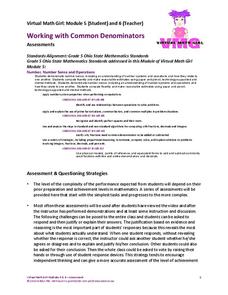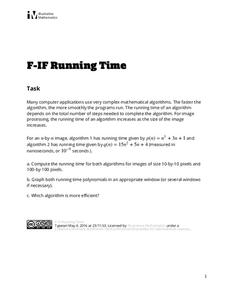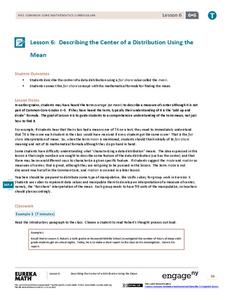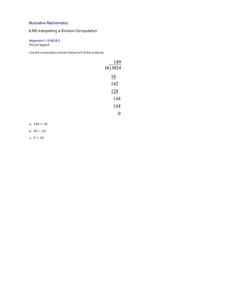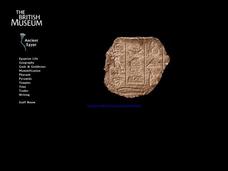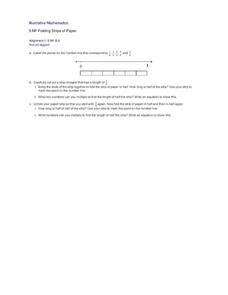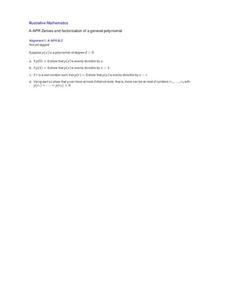EngageNY
The Division Algorithm—Converting Decimal Division into Whole Number Division Using Mental Math
Make math much simpler with mental math methods. The 16th installment in a series of 21 looks at ways scholars can apply mental math to convert division problems into easier problems with the same quotient. Multiplying or dividing both...
PBS
Working with Common Denominators: Assessments
Now that the practice is over, see if young mathematicians can utilize their new skills on finding common denominators and adding fractions. The assessment contains one map challenge and follows with skills practice.
EngageNY
The Division Algorithm—Converting Decimal Division into Whole Number Division Using Fractions
Knowing the standard algorithm opens up a whole new world of division. Scholars learn how to convert division involving decimals to division involving whole numbers to use the standard algorithm. Knowing how to multiply with powers of...
EngageNY
Dividing Multi-Digit Numbers Using the Algorithm
Scholars learn to divide multi-digit numbers using the standard algorithm in the 14th installment in a module of 21 parts. They get plenty of practice with the algorithm by completing a worksheet.
Concord Consortium
Vending Machine
Let the resource quench your thirst for knowledge, like a vending machine that dispenses drinks. Future computer scientists develop an algorithm to identify the fewest number of coins that a vending machine could use in creating change....
Illustrative Mathematics
Running Time
Ever wonder why that computer image takes so long to load? Well, math is involved and provides the algorithms needed to compute the measure in nanoseconds. Young mathematicians plug the image measures into the formulas and compare the...
Illustrative Mathematics
How Many _______ Are In. . . ?
Help your learners gain meaningful understanding of dividing fractions using fraction models. The activity includes nine problems which are sequenced to show how the fraction division algorithm evolves. Have learners use graph paper or...
Illustrative Mathematics
Reasoning about Multiplication and Division and Place Value, Part 1
Help your class make sense of quantities and their relationships. Given is the product of two numbers. It is up to your number crunchers to think about the quantitative relationship when the product is one-tenth or ten times the product...
Noyce Foundation
Sewing
Sew up your unit on operations with decimals using this assessment task. Young mathematicians use given rules to determine the amount of fabric they need to sew a pair of pants. They must also fill in a partially complete bill for...
EngageNY
Describing the Center of a Distribution Using the Mean
Everyone does their fair share. The sixth segment in a 22-part unit presents the mean as a fair share. Groups build a conceptual understanding of the mean of a data set, rather than simply learn an algorithm. Learners use the...
Illustrative Mathematics
Interpreting a Division Computation
Mathematicians show their understanding of a division problem. If a student can apply long division to a pair of numbers and determine a quotient, what other factors and multiples become apparent? The example illustrates a simple...
Illustrative Mathematics
Gifts from Grandma, Variation 3
There are three money word problems in this activity, each one is set in the same context. The first asks what was the total amount grandma spent, the second how many grandchildren grandma has, and the third asks how much grandma spent...
Illustrative Mathematics
Reasoning about Multiplication and Division and Place Value, Part 2
The learner puts reasoning and estimation to work. The directions are to place a decimal in the answer to make the equation true. Pupils are to look at the two problems, one multiplication and one division, and estimate an answer. No...
Illustrative Mathematics
Building toward fluency
Here is a great learning task that focuses on the development of areas in computational fluency including strategies in mental math. Young learners are guided through a list of addition expressions that help them visually understand the...
Illustrative Mathematics
Video Game Credits
Help your learners understand how to divide fractions with this visual activity. They first answer a simple inequality before dividing the fractions. Two solution choices are given to help your mathematicians understand how to solve "how...
Illustrative Mathematics
Calculating and Rounding Numbers
Mathematicians need to know that not all numbers are rational. We approximate irrational number with rational numbers. That is why a calculator may be misleading. This task give learners an opportunity to see how rounding a number and...
Illustrative Mathematics
Traffic Jam
Help your learners understand dividing with fractions by using these methods to solve. Chose from two different number lines or linker cubes. This practices "how many groups?" style division problems which help them comprehend why...
Curated OER
Folding strips of paper
Fifth graders need concrete experiences to introduce a unit on multiplying fractions by fractions. A strip of paper is used to create a number line and represent 5/6. It is folded first in half, and then in quarters. After unfolding,...
EngageNY
Writing Division Expressions II
Division is division is division is division ... four different ways to write division. Scholars continue to learn about division expressions. They translate between several forms, including verbal phrases, expressions using the division...
Illustrative Mathematics
Zeroes and Factorization of a General Polynomial
These four problems will guide your class through the idea behind the Fundamental Theorem of Algebra, which states that a polynomial of degree n has exactly n roots. Use the division algorithm and the definition of a zero/root of a...
Balanced Assessment
Disc-Ness
Transform your scholars into mathematicians as they develop their own geometric definition. The task asks individuals to compare cylindrical objects and create a definition for the disc-ness of each object. They may use any method and...
Concord Consortium
Square-Ness
Are there some rectangles that are more square than others? A thought-provoking task asks individuals to create a formula that objectifies the square-ness of a set of rectangles. They then use their formulas to rank a set of...
Balanced Assessment
Compact-Ness
Creating a definition may be easier than it sounds! Give your classes experience creating their own definition. Scholars examine the meaning of the compact-ness of a scatter plot and create their own definitions based on measurements.
EngageNY
Estimating Digits in a Quotient
Boiling down any division problem to a one-digit divisor problem sure makes estimation easy. The lesson shows how to estimate division problems by using place value understanding and basic arithmetic facts to simplify the division. Some...

